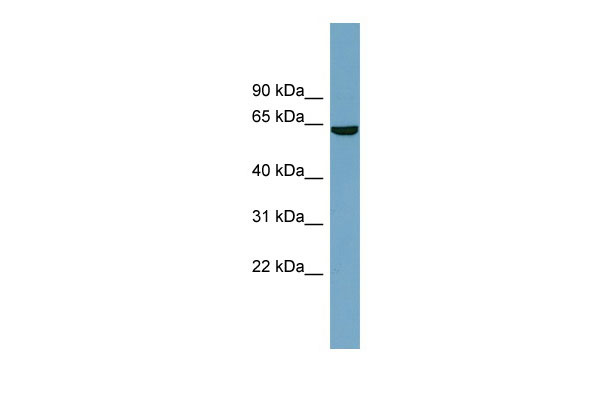SLC5A8 antibody - middle region
Rabbit Polyclonal Antibody
- SPECIFICATION
- CITATIONS
- PROTOCOLS
- BACKGROUND

Application
| WB |
|---|---|
| Primary Accession | Q8N695 |
| Other Accession | NM_145913, NP_666018 |
| Reactivity | Human, Mouse, Rat, Rabbit |
| Predicted | Rat, Rabbit |
| Host | Rabbit |
| Clonality | Polyclonal |
| Calculated MW | 66kDa |
| Gene ID | 160728 |
|---|---|
| Alias Symbol | AIT, MGC125354, SMCT, SMCT1 |
| Other Names | Sodium-coupled monocarboxylate transporter 1, Apical iodide transporter, Electrogenic sodium monocarboxylate cotransporter, Sodium iodide-related cotransporter, Solute carrier family 5 member 8, SLC5A8 {ECO:0000312|EMBL:AAP46193.1} |
| Format | Liquid. Purified antibody supplied in 1x PBS buffer with 0.09% (w/v) sodium azide and 2% sucrose. |
| Reconstitution & Storage | Add 50 ul of distilled water. Final anti-SLC5A8 antibody concentration is 1 mg/ml in PBS buffer with 2% sucrose. For longer periods of storage, store at 20°C. Avoid repeat freeze-thaw cycles. |
| Precautions | SLC5A8 antibody - middle region is for research use only and not for use in diagnostic or therapeutic procedures. |
| Name | SLC5A8 {ECO:0000312|EMBL:AAP46193.1} |
|---|---|
| Function | Acts as an electrogenic sodium (Na(+)) and chloride (Cl-)- dependent sodium-coupled solute transporter, including transport of monocarboxylates (short-chain fatty acids including L-lactate, D- lactate, pyruvate, acetate, propionate, valerate and butyrate), mocarboxylate drugs (nicotinate, benzoate, salicylate and 5- aminosalicylate) and ketone bodies (beta-D-hydroxybutyrate, acetoacetate and alpha-ketoisocaproate), with a Na(+):substrate stoichiometry of between 4:1 and 2:1 (PubMed:14966140, PubMed:15090606, PubMed:16729224, PubMed:16805814, PubMed:17178845, PubMed:17245649, PubMed:17526579, PubMed:20211600, PubMed:30604288). Catalyzes passive carrier mediated diffusion of iodide (PubMed:12107270). Mediates iodide transport from the thyrocyte into the colloid lumen through the apical membrane (PubMed:12107270). May be responsible for the absorption of D- lactate and monocarboxylate drugs from the intestinal tract (PubMed:17245649). Acts as a tumor suppressor, suppressing colony formation in colon cancer, prostate cancer and glioma cell lines (PubMed:12829793, PubMed:15867356, PubMed:18037591). May play a critical role in the entry of L-lactate and ketone bodies into neurons by a process driven by an electrochemical Na(+) gradient and hence contribute to the maintenance of the energy status and function of neurons (PubMed:16805814). Mediates sodium-coupled electrogenic transport of pyroglutamate (5-oxo-L-proline) (PubMed:20211600). Can mediate the transport of chloride, bromide, iodide and nitrate ions when the external concentration of sodium ions is reduced (PubMed:19864324). |
| Cellular Location | Apical cell membrane; Multi-pass membrane protein. Note=Expressed at the apical membrane of normal tall thyrocytes and of colonic epithelial cells |
| Tissue Location | Expressed in normal thyroid, localized at the apical pole of thyroid cells facing the colloid lumen, but expression profoundly decreased in thyroid carcinomas. Expressed in normal colon but absent in colon aberrant crypt foci and colon cancers. Present in normal kidney cortex, brain, prostate, gastric mucosa and breast tissue but was significantly down-regulated in primary gliomas, gastric cancer, prostate tumors and breast tumors |

Thousands of laboratories across the world have published research that depended on the performance of antibodies from Abcepta to advance their research. Check out links to articles that cite our products in major peer-reviewed journals, organized by research category.
info@abcepta.com, and receive a free "I Love Antibodies" mug.
Provided below are standard protocols that you may find useful for product applications.
If you have used an Abcepta product and would like to share how it has performed, please click on the "Submit Review" button and provide the requested information. Our staff will examine and post your review and contact you if needed.
If you have any additional inquiries please email technical services at tech@abcepta.com.













 Foundational characteristics of cancer include proliferation, angiogenesis, migration, evasion of apoptosis, and cellular immortality. Find key markers for these cellular processes and antibodies to detect them.
Foundational characteristics of cancer include proliferation, angiogenesis, migration, evasion of apoptosis, and cellular immortality. Find key markers for these cellular processes and antibodies to detect them. The SUMOplot™ Analysis Program predicts and scores sumoylation sites in your protein. SUMOylation is a post-translational modification involved in various cellular processes, such as nuclear-cytosolic transport, transcriptional regulation, apoptosis, protein stability, response to stress, and progression through the cell cycle.
The SUMOplot™ Analysis Program predicts and scores sumoylation sites in your protein. SUMOylation is a post-translational modification involved in various cellular processes, such as nuclear-cytosolic transport, transcriptional regulation, apoptosis, protein stability, response to stress, and progression through the cell cycle. The Autophagy Receptor Motif Plotter predicts and scores autophagy receptor binding sites in your protein. Identifying proteins connected to this pathway is critical to understanding the role of autophagy in physiological as well as pathological processes such as development, differentiation, neurodegenerative diseases, stress, infection, and cancer.
The Autophagy Receptor Motif Plotter predicts and scores autophagy receptor binding sites in your protein. Identifying proteins connected to this pathway is critical to understanding the role of autophagy in physiological as well as pathological processes such as development, differentiation, neurodegenerative diseases, stress, infection, and cancer.


